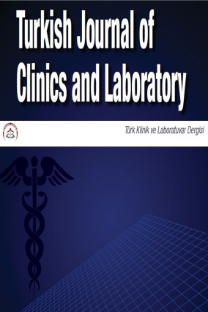KRAS mutasyonlarının kolon ve akciğer kanseri eksozomlar aracılığıyla tayini ve primer dokuya kıyasla mutasyon durumlarının analizi
Likit biyopsi, KRAS, eksozom, DNA
Detection of KRAS mutations by colon and lung cancer exosomes and analysis of mutational statuses compared to primary tissue
liquid biopsy, KRAS, exosome, DNA,
___
- 1. Jemal A, Siegel R, Ward E, Hao Y, Xu J, Thun MJ. Cancer statistics, 2009. CA Cancer J Clin 2009; 59: 225-49.
- 2. Langer CJ. Roles of EGFR and KRAS Mutations in the Treatment Of Patients With Non-Small-Cell Lung Cancer. P T 2011; 36: 263-79.
- 3. Vogelstein B, Fearon ER, Hamilton SR et al. Genetic alterations during colorectal-tumor development. N Eng J Med 1988; 319: 525-32.
- 4. Arrington AK, Heinrich EL, Lee W et al. Prognostic and Predictive Roles of KRAS Mutation in Colorectal Cancer. Int J Mol Sci 2012; 13: 12153-68.
- 5. Lièvre A, Bachet JB, Boige V et al. KRAS mutations as an independent prognostic factor in patients with advanced colorectal cancer treated with cetuximab. J Clin Oncol 2008; 26: 374-9.
- 6. Qiu LX, Mao C, Zhang J et al. Predictive and prognostic value of KRAS mutations in metastatic colorectal cancer patients treated with cetuximab: a meta-analysis of 22 studies. Eur J Cancer 2010; 46: 2781-7.
- 7. Linardou H, Dahabreh IJ, Kanaloupiti D et al. Assessment of somatic k-RAS mutations as a mechanism associated with resistance to EGFR-targeted agents: a systematic review and metaanalysis of studies in advanced non-small-cell lung cancer and metastatic colorectal cancer. Lancet Oncol 2008; 9: 962-72.
- 8. Garassino MC, Borgonovo K, Rossi A et al. Biological and clinical features in predicting efficacy of epidermal growth factor receptor tyrosine kinase inhibitors: a systematic review and metaanalysis. Anticancer Res 2009; 29: 2691-701.
- 9. Mascaux C, Iannino N, Martin B et al. The role of RAS oncogene in survival of patients with lung cancer : asystematic review of the literature with meta-analysis. Br J Cancer 2005; 92: 131-9.
- 10. Schiller JH, Adak S, Feins RH et al. Lack of prognostic significance of p53 and KRAS mutations I primary resected non-small-cell lung cancer on E4592: A laboratory ancillary study on an eastern cooperative oncology group prospective randomized trial of postoperative adjuvant therapy. J Clin Oncol 2001; 19: 448-57.
- 11. Shepherd FA, Domerg C, Hainaut P et al. Pooled analysis of the prognostic and predictive effects of KRAS mutation status and KRAS mutation subtype in early-stage resected non-small-cell lung cancer in four trials of adjuvant chemotherapy. J Clin Oncol 2013; 31: 2173-81.
- 12. Pantel K, Alix-Panabières C. Liquid biopsy and minimal residual disease - latest advances and implications for cure. Nat Rev Clin Oncol 2019; 16: 409-24.
- 13. Babayan A, Pantel K. Advances in liquid biopsy approaches for early detection and monitoring of cancer. Genome Med. 2018;10(1):21. 3. Alix-Panabie` res C, Pantel K. Circulating tumor cells: liquid biopsy of cancer. Clin Chem 2013; 59: 110-8.
- 14. Mader S, Pantel K. Liquid Biopsy: Current Status and Future Perspectives. Oncol Res Treat. 2017; 40: 404-8.
- 15. Sluijter JP, Verhage V, Deddens JC et al. Microvesicles and exosomes for intracardiac communication. Cardiovasc Res 2014; 102: 302–11.
- 16. Kalluri R. The biology and function of exosomes in cancer. J Clin Invest. 2016; 126: 1208-15.
- 17. Kahlert C, Melo SA, Protopopov A, et al. Identification of doublestranded genomic DNA spanning all chromosomes with mutated KRAS and p53 DNA in the serum exosomes of patients with pancreatic cancer. J Biol Chem 2014; 289: 3869-75.
- 18. Jahr S, Hentze H, Englisch S et al. DNA fragments in the blood plasma of cancer patients: quantitations and evidence for their origin from apop- totic and necrotic cells. Cancer Res 2001; 61: 1659–65.
- 19. Milane L, Singh A, Mattheolabakis G, Suresh M, Amiji MM. Exosome mediated communication within the tumor microenvironment. J Control Release 2015; 219: 278-94.
- 20. Thierry AR, Mouliere F, El Messaoudi S et al. Clinical validation of the detection of KRAS and BRAF mutations from circulating tumor DNA. Nat Med 2014; 20: 430-435.
- 21. Perrone F, Lampis A, Bertan C et al. Circulating free DNA in a screening program for early colorectal cancer detection. Tumori 2014; 100: 115-21.
- 22. Skog J, Würdinger T, van Rijn S et al. Glioblastoma microvesicles transport RNA and proteins that promote tumour growth and provide diagnostic biomarkers. Nat Cell Biol 2008; 10: 1470-6.
- 23. Castellanos-Rizaldos E, Grimm DG, Tadigotla V et al. ExosomeBased Detection of EGFR T790M in Plasma from Non-Small Cell Lung Cancer Patients. Clin Cancer Res. 2018; 24: 2944-50.
- ISSN: 2149-8296
- Yayın Aralığı: Yılda 4 Sayı
- Başlangıç: 2010
- Yayıncı: DNT Ortadoğu Yayıncılık AŞ
Ergül BELGE KURUTAŞ, İlter DEMİRHAN
Palpabl meme kitlelerinde fizik muayene ve radyolojik bulguların tanısal gücü
Günay RONA, Ecem MEMİŞOĞLU, Ramazan SARI, Yasin TOSUN, Bağış TAŞDOĞAN
Yoğun bakımdaki COVID-19 malign ve nonCOVID-19 malign hastalarda mortalite farklı mıdır?
Behiye Deniz KOSOVALI, İbrahim KOÇ, Gül Meral KOCABEYOĞLU, Berkay KÜÇÜK, Mehmet MUTLU
Sağlık Personelinde COVID-19 Aşısı Sonrası Spike Antikor Düzeyleri Ne Durumda?
Şafak KAYA, Mehmet Serdar YILDIRIM, Şeyhmus KAVAK, Fuat ALAKUŞ, Mehmet Diyaddin GÜLEKEN, Yılmaz MERTSOY, Rojhat ALTINDAĞ, Muhammet ASENA, Şehmuz KAYA
Koroner arter hastalığı ile indirekt inflamatuar belirteçlerin ilişkisi
Covid-19 pandemisi daha komplike akut apandisit olgularına mı yol açtı ?
Doğukan DURAK, Ertugrul Gazi ALKURT, Veysel Barış TURHAN, Hüseyin KÖSEOĞLU
Mustafa Bilal ÖZBAY, Yasin ÖZEN, Özcan ÖZEKE, Burak AÇAR, Mustafa KARAKURT, Mevlüt Serdar KUYUMCU, Kadriye GAYRETLİ YAYLA, Çağrı YAYLA, Ahmet ERTEM, Dursun ARAS
